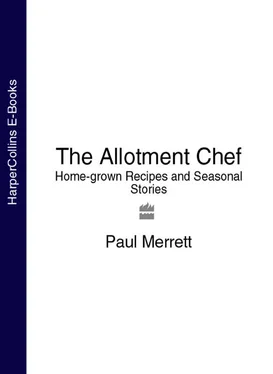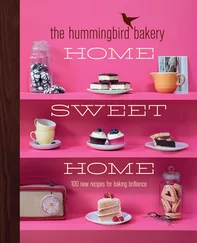The thought of producing our own fruit is very exciting. It reminds me of long hot childhood summers spent picking raspberries, blackcurrants, redcurrants and gooseberries with my sister in our grandfather’s garden. We would pick kilos of fruit that my granny would then turn into jams, fools, jellies and preserves. The books advise that we don’t pick any rhubarb this year because we have to allow it to establish itself. However, MJ’s standard (and most delicious) dessert is rhubarb crumble, so I have promised she can make one batch later in the year.
Apart from the potatoes, all the now-planted crops are permanent – they come back each year and don’t wish to be shunted around the plot. Our rotational beds cause a little more angst because they cover a greater area so getting the beds sieved and cleared of all the debris is a mammoth task. We have, however, made some progress. We have potatoes in one of our three rotational beds and a second bed for legumes is well on the way – this bed will be for beans, tomatoes, spinach, lettuce and leeks. This leaves just one space uncultivated. As soon as we can sort this one out we will plant brassicas.
Geoff Hamilton says in his book that, because we have inherited such a poor plot, it is important to enrich the soil with manure just as we did with the potatoes we planted. To this end I buy copious amounts of well-rotted farm manure from the garden centre (I have bought some crap in my life). It also seems that one should spread on a general fertiliser, so I use Grow More pellets. I am not really sure how organic these are but, right now, I have bigger responsibilities than saving the planet – I need to move this venture along swiftly and I will take whatever measures I have to!
The additional books I purchased at Wisley are proving, with one exception, most useful. By far the best is an RHS one, cleverly titled Fruit and Vegetable Gardening and written by Michael Pollock. It contains detailed information on plants as well as diagrams on pruning and general tips. This will definitely be a much-thumbed book. On the other hand, one is now on my ‘books to be avoided’ list. It is by Robin Shelton and is called Allotted Time . The book is basically a journal written by some bloke who has never gardened before (sound familiar?), and he takes the reader on a month-by-month journey through the gardening year. I only read about three pages before I begin to think that the book I am struggling to write has already been written. I realise that, if I read any more of it I will be become despondent, not least because his seems to be so much funnier than mine. Recent news has featured a legal battle between Dan Brown and some chaps who claim they have already written The Da Vinci Code . The case is threatening the release of a film of the book. Will a similar scandal hit the gardening world with allotment holders taking sides between me and Robin Shelton? While we sling organic manure at each other in court, a host of actors led perhaps by George Clooney (set to play me, of course) await the go ahead to release the blockbuster Brassicas Quest . My saving grace is that, as far as I can tell from the book, Mr Shelton is no cook, so at least I have him on that one. The book is now hiding in my sock drawer.
Photograph by Mary-Jane Curtis
Chapter 5 | iPods and Asparagus
As a chef I am lucky enough to go to some really interesting foody events. Not long ago I was invited to Dorset to present the Dorset Food Awards and give a small talk on regional cuisine. The evening was a big success and afterwards, the organiser, Fergus, suggested I might like to return for the World Nettle Eating Championships. Unfortunately, I can’t make it to this important event, but it has given me an idea.
Despite having cleared half our plot, we are yet to eat anything from the place and this is a constant source of frustration to me. I have considered stealing vegetables from our allotment neighbours but this really isn’t in the spirit of things (and anyway they would all find out when I publish the book). But one thing we can eat that is growing in profusion is stinging nettles.
A few years ago, while head chef at The Greenhouse in Mayfair, I put nettle soup on the menu and it was a huge hit. What is a little embarrassing to acknowledge about this, however, is that I bought the nettles from a vegetable supplier. Nettle soup is actually a well-loved dish on the continent, but it is obvious that, if I am caught at home cooking nettles for human consumption, my children will be on the phone to Esther Rantzen at ChildLine quicker than you can say ‘dock leaf’. However, if I am careful to knock up the soup when no one is home, then I can probably pass it off as pea soup, and no one will be any the wiser.
One morning, therefore, I go down to the allotment with a pair of rubber gloves and a dustbin bag and start collecting nettles. They grow mostly along the borders of the allotment against a wire fence. With my Marigolds on, I am able to sift through and choose only the youngest, tenderest nettles; back home I turn them into a brilliant green creamy broth that everyone agrees is the best pea soup they have ever tasted. Sensing my moment of triumph, when the last spoonful has been eaten, I proudly tell them the truth – at which point Ellie bursts into tears and says her mouth is ‘sting-y’. Who cares about mouth ulcers when we have just eaten our first allotment meal? I wonder what cooch grass is like?
I quite enjoy my solo trips to the allotments, and during the week the plots are relatively quiet. Our most immediate neighbour there is Andy, who seems to spend days on end at the allotments but never on the same plot. While we have nodded a hello in the past, I have not ever had a chat with him, so, when we pass on the path one morning, I make a quip about which plot he might be working on today.
Andy explains that he is the Vice Chairman of the Blondin Allotments committee and, as such, he regularly checks the entire area and looks over plots that seem to be falling behind in terms of maintenance. I had never realised that our closest fellow gardener is part of the Blondin secret police.
Although we have moved the plot forwards in the past two months, I am aware that our initial start has been anything but convincing, so I ask him if we have violated the rules by not coming to the plot from December to March. He, surprisingly, replies that quite the opposite is true and that, in fact, they are all rather impressed with our efforts. Furthermore, Andy lets slip that one of the adjacent plots to ours is on the hitlist and, if the owner is evicted, we might be offered a plot extension. This faith in us should be heartening but, having worked so hard to get to where we are, I am not sure if I could start all over again on another bit.
We say our goodbyes and walk off in opposite directions. It’s good to get to know a few people at the site because a day’s digging can be a lonely life. At first, although Sheila and Keith had been friendly, few other people acknowledged us as we walked to our patch but, now we have proved ourselves as hardcore, green-fingered regulars, we have been accepted into the clan.
Sheila always calls hello as we come through the gate and invites the kids over and Keith will come over for a chat, and John – a plot away from us – is also a friendly chap, and there is the most charming West Indian woman who always stops me and asks when I’m next on the telly. My standard response is to joke that she should forget all about that CCTV appearance on Crimewatch and not say a word to anyone; every time she laughs as hard as the first, which is very kind.
On the other hand, several of the plot holders have erected large fences made of poles and bits of wood around their plots and these guys tend not to be the ‘good morning, nice day’ types. They appear to have barricaded themselves in. Then there is Mr iPod Man, who sings out loud while he works. He is usually bent over planting or digging and, while I have never worked out who he’s listening to on his iPod, it is obviously a band that he knows well, because he is always in full song whatever the time of day.
Читать дальше












